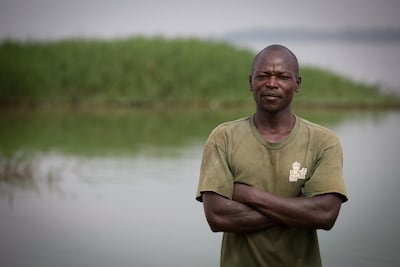In most countries, a job in the armed forces is considered a dangerous occupation. Firefighters and police officers regularly put themselves in harm’s way. But in Kisumu, Kenya, a career as a car washer is thought of as a death sentence.
The cleaners are required to spend their days part-submerged in Lake Victoria, which offers a plentiful supply of free water for washing the vehicles, driven into the shallows by their owners. The lake is also home to freshwater snails, which spread the microscopic worms that cause schistosomiasis, or ‘snail fever’, which is second only to malaria as the world’s most-deadly parasitic disease.
People take the jobs anyway, says Ellen Agler, the chief executive of the End Fund, a New York-based charity which is working to end the suffering caused by neglected tropical diseases (NTD), including snail fever. She recently met one of the Lake Victoria car washers, Simeon Ogola Aquiro.
“The people who are car washers, they are in that water for the whole day, which is known to have really high prevalence of this certain type of snails that carry schistosomiasis,” Ms Agler said. “They cannot protect themselves from it, so there is incredibly high mortality if you’re a car washer there, or a fisherman.
“Simeon needed a job – it’s either starve, steal, or take one of the jobs you can get in that area. For him, he grew up mentored by the older car washers, but he said everyone knew you wouldn’t live past 40 if you were a car washer, and all the older guys had passed away.”
_________________
Read more:
Abu Dhabi summit to be told of threat posed by anti-vaccine conspiracy theories
Governments have a 'moral duty' to tackle preventable diseases
Fake US vaccine scheme to catch Bin Laden was 'huge mistake'
_________________
Simeon was able to receive a “life-saving and livelihood saving treatment,” one of many millions who are now able to access cures for NTDs, thanks to scientific developments and funding. However, many more people are continuing to suffer.
Other NTDs include river blindness – the causes of ‘villages of the blind’ where most adult inhabitants have been known to lose their sight, and trachoma, responsible for the loss of sight in close to 2 million people worldwide. Lymphatic filariasis, spread by mosquitos, can cause severe disability by bringing on elephantiasis - swelling of parts of the body - and threatens 946 million people.
Overall, the group of parasitic and bacterial infectious diseases affect more than 1.5 billion people, including around 875 million children, killing 200,000 a year. However, as the victims are often in some of the poorest and most isolated communities, their cause can struggle to attract attention and despite progress, enough funding.
“Sometimes it feels like the diseases that have been around for the longest, and are most prevalent, don’t get as much attention,” said Ms Agler.
“Humanity has been living with them for thousands of years – trachoma was highly endemic in the middle ages in Europe and in the US and American south hookworm affected most of the population. But in the west we haven’t seen them affect us for 100 years.
“The common factor is if you don’t have access to clean water and sanitation, often you will have one of these diseases. They are incredibly prevalent.”
Ms Agler's new book, Under the Big Tree: Extraordinary Stories from the Movement to End Neglected Tropical Diseases, aims to tell some of the human stories of NTDs and is being launched in the new year.
She said that despite a lack of public attention in the west, rapid progress is being made as new treatments are developed. The fight is being supported by foreign governments such as the US and the UK, as well as significant funding from the UAE.
Speaking at the Gavi conference in Abu Dhabi, Ms Agler praised backers in the UAE who have helped make significant progress in tackling NTDs. They include Legatum, the Dubai-based investment and Sheikh Mohamed bin Zayed, Crown Prince of Abu Dhabi. Sheikh Mohamed last year pledged US$20 million to a new, $100m fund to rid the world of river blindness and lymphatic filariasis.
It is hoped that by 2030, only 200 million people will need treatment for the diseases, compared to 1.5 billion now. In the long term, experts say some diseases be wiped out entirely, with quick treatment available for others.
“It feels like we have a convergence of additional funding, medicines available – the pharmaceutical companies donate about $4 billion of medicine a year, Ms Agler said.
“To me it’s an amazing good news story. Some countries are certifying the elimination of trachoma, the elimination of lymphatic filariasis. Hundreds of millions of people don’t need treatment, who would have needed treatment 10 years ago. This is a modern victory. Last year, one billion people were treated for at least one of these diseases, which is a massive scale-up.”


